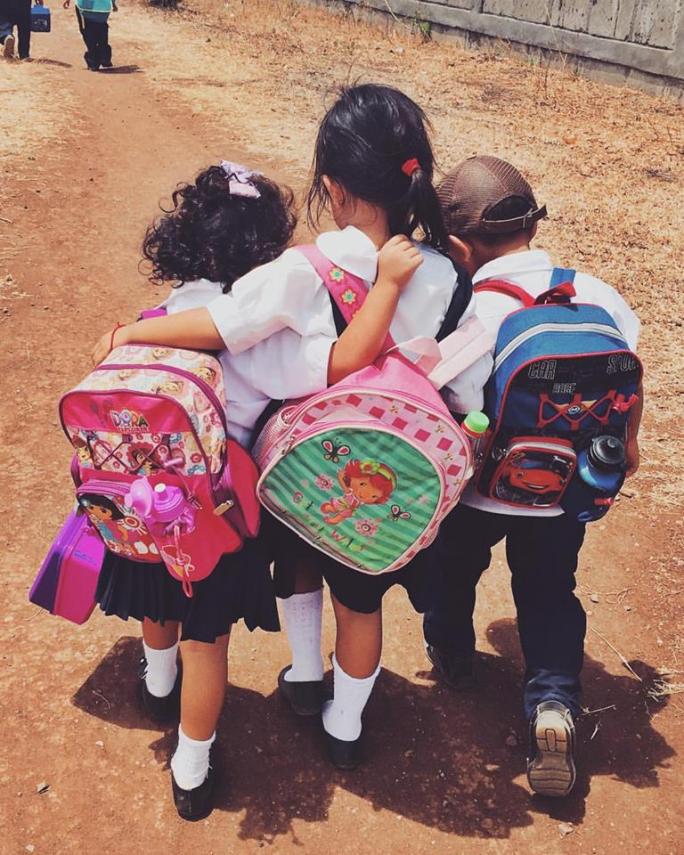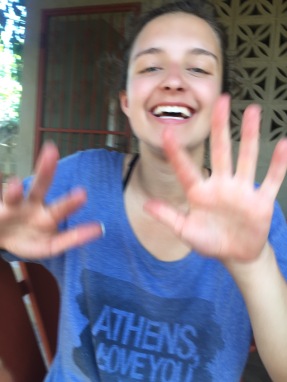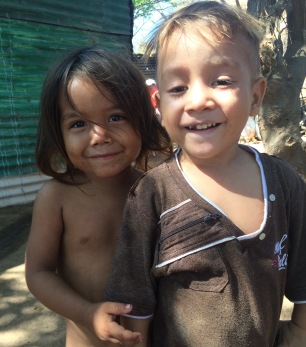I want to start off with two things:
A thank you.
Because so many of you supported me, whether it be through prayers, encouragements, or financially. If you’re saying “Wait what is she talking about, did she go somewhere? Transfer? Buy a new car?”, no worries. Choice A was correct; I went to Nicaragua last week. And at most, you didn’t stop me. So thanks for that.
Secondly,
An apology.
Because I cannot repay you in any substantial way. I have no pictures to show you. Even my attempts to describe the experience are futile. Not because you wouldn’t understand but because I think that’s how it always is when a person is immersed in another culture. The experience is not capable of being described within the context of our local language.
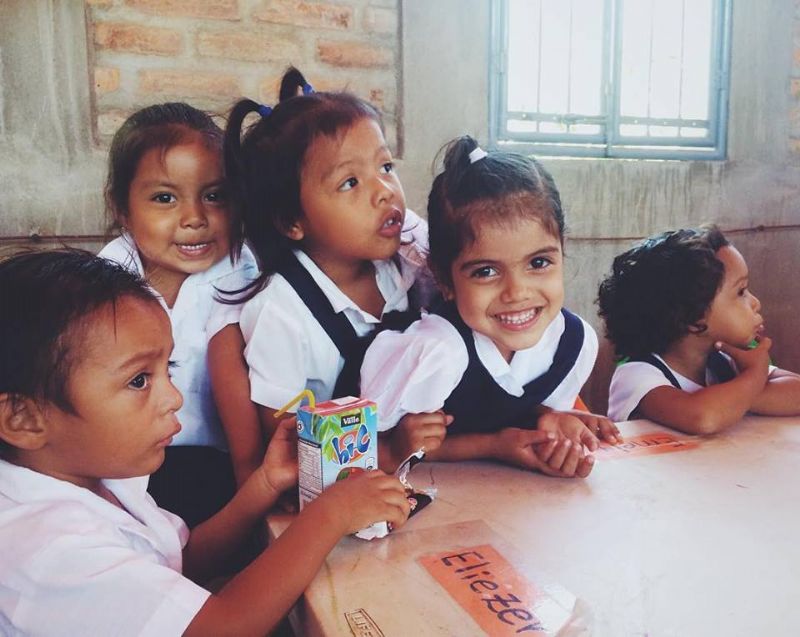
But I do have these words, so I offer them in return. Whether they’ll strike a chord or even make any sense at all I don’t know, but I feel like I owe them to you to leave them here.
To start, if you’re wondering why I don’t have any pictures, well, it wasn’t exactly a planned decision. If you’ve been around me long enough, you’ve probably noticed that I love taking pictures and videos. I love looking for creative angles on reality and capturing the beauty in a moment, so that I can look back on it and see even more in it than I did while it was happening. I want to be clear: There is nothing wrong with photographs at all.
But there was something wrong with me. You see, taking photographs is putting a screen in front of your face and filtering your reality through the lens in front of you. It can be expansive and beautiful, but it can also be limiting if you aren’t careful. Limiting when you see only a flat portrayal of a 3-D world. Limiting when you strip sound and movement from a moment. Limiting, most of all, when you’re using only your camera to capture instead of your mind. And of that, I was so often guilty.
I think it’s important to ask yourself these two things when photographing an experience:
1. Your intentions. Are they for self-promotion or for remembering what you’ve learned? (which ironically, is often to be humble and selfless)2. Your involvement.The line at which you become so focused on taking the memories that you forget about making them.
For me, as a photo-enthusiast, I knew the temptation was great. I’m a perfectionist. A hoarder of experiences. I don’t stop at one photograph. I would have blurred the line more with each photo I drew into focus, until the distinction was so vague that I could wiggle back and forth in the grey area.
I got off the plane, and everything I saw drew my hand to my pocket. I wanted to capture it all. But something in me resisted the urge. I had to escape the pressure, and there was only one way. Put down the phone. I would allow myself only one picture, and when I saw that moment, I would know It. “This is the one.”
In the meantime, I told myself I would take pictures in my head. With my eyes. And, because the other half of my mind responded like a child does to a parent who says “maybe later”, I gave myself some more reassurance that it wasn’t just a cop-out answer. To materialize my mental images, I would capture them through words in my journal.
So that’s how I journaled my entire trip. I didn’t do my usual “hey God, so today we went to a nursing home…” I just drew an emblem of a camera and wrote out all the details of the photograph I didn’t take.
And let me tell you, I learned so much. By separating my recording of the moment from my experiencing of it, I got twice as much out of every minute. My experiences were stronger. They were clearer and unaltered because I was “all there” and without distraction. I didn’t need a camera to remember them because I experienced them so fully that my memory alone could recall every detail as I wrote them later that day.
I came home w/ roughly 35 written “photos”. I’d like to share a few of them with you.
________________________________________________________________

We build fires to clear the brush the power company left behind. It is a dry spell. You’ll think it would burn in an instant. But it’s so difficult, mostly because we get over-eager and smother the fire with too many branches. I start thinking that maybe faith is like that fire; it’s not sufficient in only spurts. It is laborious & continual. Slow. Difficult. You must nurture the flame, even while the branches are still dry. Because the rain is coming.

Fernanda braids my hair. “Trensa,” she calls it. It doesn’t matter what she calls it, though. We understand.

Kathy asks me how to say “good job” in Spanish during our VBS lesson. I tell her it’s “mochila” (backpack). She waves good-bye to all the kids, telling them what a “mochila” they did. The kids look confused. Classic.

At the dump, a woman cleans out a bleach container with a swish of water. We give her food in a bowl, but she immediately empties it into the container. For her children.

We barter in groups for pencil sharpeners in the market to give to the church. It’s a competition. They’re 5 for 25 cordobas (roughly $1 for all 5). In broken Spanish, I ask to pay 20 cordobas instead. The man agrees hesitantly and hands me the bag, saying something too quickly for me to understand. I ask the translator. He repeats it. “You have so much money, and yet you are asking me for less.”

We climb the clocktower at La Merced. You can see for miles all the clay-potted roofs, interrupted only by the lush of inner courtyards that hint at the natural beauty standing off in the distance. You can see that, too. The Lake Nicaragua and the volcanoes that sit on the horizon. It’s breath-taking.

I’m coloring with a five-year-old girl at the schoolhouse. I tell her she is a great artist and ask her what she wants to be when she grows up. “Artista? Profesora?” She says, “Gringa.” An American. I wonder if I should find that sad. But then she laughs. She knows her answer is silly. But a silly answer for a silly question; she doesn’t think about who she wants to be, what successes and accomplishments she hopes to achieve. She just thinks about who she is. A five-year-old girl.
 I’m journaling on the porch, and a little girl comes from the VBS lesson. She asks to see my phone. She asks what my name is. Where I sleep at night. She asks about a thousand questions a minute, and I have to keep reminding her I don’t understand her when she talks too fast. She speaks zero English, and she doesn’t understand why anyone would. She tells me her American aunt speaks Spanish, so why don’t we all? (In Spanish) she says, “My aunt lives where there are mountains and snow. Her is Maria. Do you know her?”
I’m journaling on the porch, and a little girl comes from the VBS lesson. She asks to see my phone. She asks what my name is. Where I sleep at night. She asks about a thousand questions a minute, and I have to keep reminding her I don’t understand her when she talks too fast. She speaks zero English, and she doesn’t understand why anyone would. She tells me her American aunt speaks Spanish, so why don’t we all? (In Spanish) she says, “My aunt lives where there are mountains and snow. Her is Maria. Do you know her?”

We wake up at 4 a.m. and hike the mountain to see the sun rise. I tell Kathy the Nicaraguans got their name because they used to have no water (“nica” “agua”), but then they migrated and found Lake Nicaragua. The name stuck; it’s ironic. Of course, it’s also completely untrue. I think she still believes me.
________________________________________________________________
As far as the photograph goes, I’d love to say I had that one “moment” where I whipped out my phone and encapsulated the entire trip in a single shot. I didn’t.
The trip was far too complex for that.
I settled for a photo atop the bell tower with my dear friend Bex and all of Granada in the background. I don’t know why I chose it, perhaps because the scale was so expansive, and the view so beautiful. I hoped it would hint at the grandeur of the experience, to do the entire trip justice in a simple photograph. It didn’t. But here it is nonetheless:
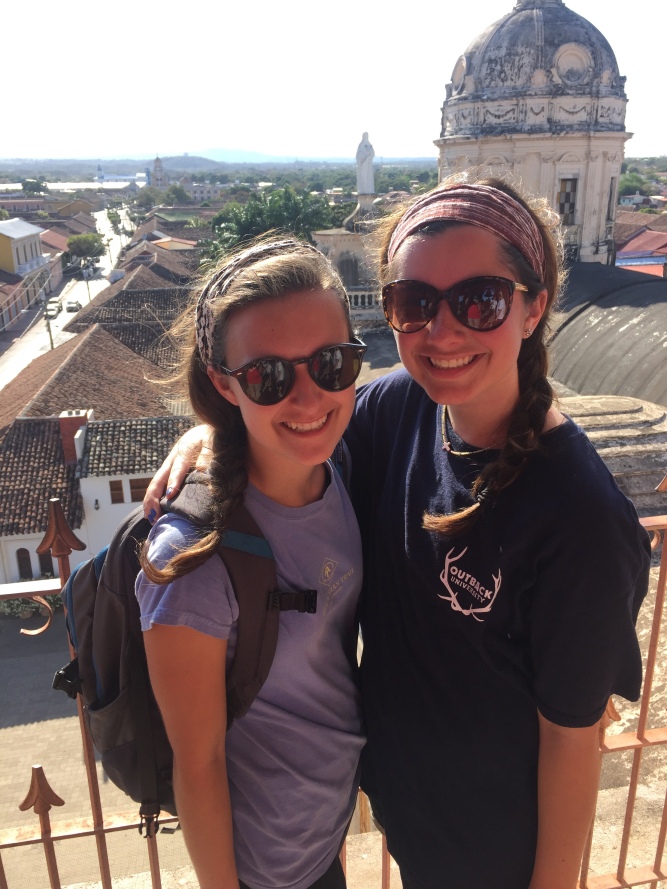
I’d be not only arrogant but also ignorant to claim I made a significant change to the country of Nicaragua in the short time I spent there. Sure, we did some hard labor and built the foundations for some meaningful relationships that I plan to continue (s/o to technology & the 21st century for that one). But the short term doesn’t interest me nearly as much as longevity.
I’m interested in where to go from here. In where I could spent a long period of time, really growing the relationships I start. Or in what I could do back at home to live a little more like they do.
Sure, the country needs our help, and it needs it badly. Poverty has attacked the country, not rapidly like an air strike but like a disease that seeps into even the most inward and personal parts of it, that eats slowly at the core of the country and lives on for generations. But we have something to learn from their disease. Because every tragedy is in some way beautiful.
If there could exist a utopia of the ideal lifestyle, it would certainly fall somewhere between here and there.
Because yes, their lives are heartbreaking and at times, dangerous. While we were there, a young boy died because he choked on a piece of meat. A woman on medication died because she suddenly became ill, and there were no other medical options. Would these things have happened in America? Probably not.
But also, the people are happy. You can’t polarize something as complex as a nation’s well-being into “good” and “bad”, “right” and “wrong”. It is far more complicated than that. There is always more to the story.
But I’ll tell you one thing, though they live closer to death, they also live closer to life. To the fullness of life, in all that God intends it to be. To the very heart of the thing.
In the states, we live such separate existences. We lock every door. There, the doors are often open. We trust no one because we know no one. Our crimes are far more hanous. Murder, violence. They are faceless and heartless.
In Nicaragua, there are robberies. The people have nothing. They rob to stay alive. But they never hurt their fellow beings. Murder, violence, those are extremely rare. Because they know their neighbors, and once you know a person, you could never justify such a thing.
You see, we sterilize everything about us and then wonder why God doesn’t show up to heal our inner illnesses. We don’t leave room for God in America. Sure, there are parts of Nicaragua where the people don’t see Him, but I’d like to think if He showed up, He would at least have a place to stay the night. A people willing to take in a stranger, willing to hear a new perspective, willing to give anything at all a try. Because that’s what you do when you’re desperate. Here, I’m not so sure.
So I didn’t heal the country. The people didn’t all fall to their knees and accept the love of Christ and forever heal their brokenness. But I have no interest in popcorn evangelism.
I planted seeds. I would allow myself that. I planted seeds of God’s goodness and hints at His grace that I hope will blossom in my absence.
But mostly, God planted seeds in me. He planted hopes and dreams, but He also planted heart aches to assure I will not abandon the dreams. He even planted disgust in some regards, disgust at entitlement, at the separation with which we live our lives, at the emptiness of spirit that accompanies the fullness of our bank accounts. These are not merely attacks or social criticisms; I am just as inflicted.

We sing for a woman who has been bedridden for four years. We tell her God is faithful, but she doesn’t need us to tell her. She smiles. We start to pray for her, and she interrupts. She says, “But pray for my husband.”
I am blessed and thankful to be an American, to have assurance I will be fed and provided for and educated. But I have tasted freedom from the blessing, a blessing that becomes a curse if you are not careful.
One day in Granada, we saw a hearse come through the street. I was reminded of one of the funny little quotes I had in my room back home, “You never see a hearse with a U-Haul truck behind it.” Sure, these people had nothing. But it only made it that easier for them to give it all up.
And in the end, won’t that be all that matters?
